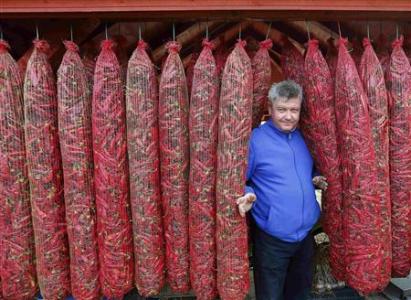
Like a handful of others in the area, the 41-year-old is hoping to put Hungary's once booming paprika business back on the map after decades of neglect and despite fierce competition from countries including Brazil, Serbia and China.
Szabo is following in the footsteps of his father and grandfather - they also made the powdered paprika spice that has long been a staple in Hungarian cooking.
"I want to make sure people still eat Hungarian paprika," he said, as he poured a batch of gutted, dried and carefully selected peppers into a shiny steel electric grinder. "I stake my life on this: clean organic food, no preservatives."
Although still on a small scale, Szabo has had some success. He sells his paprika to some of the best restaurants in Hungary and has begun to find clients abroad.
But it is a far cry from Communist times, when every family in Batya had a paprika patch and some fields were as large as 50 hectares, compared with Szabo's two-hectare paprika plot.
At this time of year, drying wreaths of red peppers would hang from every roofline, but as competition undercut prices and growers quit for better-paid work elsewhere, the flood of red is all but gone.
Szabo has invested everything he owns into custom-made machines and uses methodical marketing, going after gourmets who value organic food and are willing to pay extra for it. Quality is the only way to survive, he says.
Two-thirds of his customers have returned to him after a first try. They include chefs at Hungary's top restaurants as well as regular customers. Some buyers drive hours each way to stock up.
Szabo's expertise is not unlike that of a winemaker.
"You have to let the pepper ripen on the vine and pick it at just the right time," he said. "Remove the stems by hand, then dry the peppers slowly, at a very low heat. After 20 to 30 days the sugar caramelizes and turns into the red coloring agent."
If the peppers get the right amount of sunlight, the right temperature and the proper care, you get a good vintage. 20 grams of it is enough to spice up to one kg of meat and dye it deep red. 2012 was too hot and the paprika was mediocre, Szabo said. This year's vintage is nearly ideal.
One of the few other local paprika farmers is local Batya policeman Zsolt Matos. He, too, says quality is the only weapon small farmers have against cheap imports of paprika that he says are often ground here and mislabeled as Hungarian.
"Luckily Hungarians are slowly turning toward quality," he said near his field, where a dozen workers picked the red peppers and left the green ones to ripen a few more weeks.
"Supermarket paprika contains stems, seeds, and is ground more coarsely. If you use fine stuff the taste and the color is more intense, and all of it diffuses into the food... It's like tasting mediocre or fine wine. You will know the difference."





